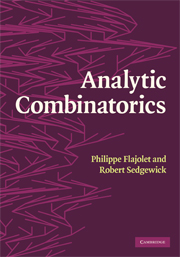
-
Select format
-
- Publisher:
- Cambridge University Press
- Publication date:
- 11 April 2011
- 15 January 2009
- ISBN:
- 9780511801655
- 9780521898065
- Dimensions:
- (247 x 174 mm)
- Weight & Pages:
- 1.6kg, 826 Pages
- Dimensions:
- Weight & Pages:
You may already have access via personal or institutional login
Book description
Analytic combinatorics aims to enable precise quantitative predictions of the properties of large combinatorial structures. The theory has emerged over recent decades as essential both for the analysis of algorithms and for the study of scientific models in many disciplines, including probability theory, statistical physics, computational biology, and information theory. With a careful combination of symbolic enumeration methods and complex analysis, drawing heavily on generating functions, results of sweeping generality emerge that can be applied in particular to fundamental structures such as permutations, sequences, strings, walks, paths, trees, graphs and maps. This account is the definitive treatment of the topic. The authors give full coverage of the underlying mathematics and a thorough treatment of both classical and modern applications of the theory. The text is complemented with exercises, examples, appendices and notes to aid understanding. The book can be used for an advanced undergraduate or a graduate course, or for self-study.
Awards
Winner, 2019 Leroy P. Steele Prize for Mathematical Exposition, American Mathematical Society
Winner of the Choice Outstanding Academic Title 2009
Reviews
'… thorough and self-contained … presentation of … topics is very well organised … provides an ample amount of examples and illustrations, as well as a comprehensive bibliography. It is valuable both as a reference work for researchers working in the field and as an accessible introduction suitable for students at an advanced graduate level.'
Source: EMS Newsletter
Contents
Metrics
Altmetric attention score
Full text views
Full text views help Loading metrics...
Loading metrics...
* Views captured on Cambridge Core between #date#. This data will be updated every 24 hours.
Usage data cannot currently be displayed.
Accessibility standard: Unknown
Why this information is here
This section outlines the accessibility features of this content - including support for screen readers, full keyboard navigation and high-contrast display options. This may not be relevant for you.
Accessibility Information
Accessibility compliance for the PDF of this book is currently unknown and may be updated in the future.


